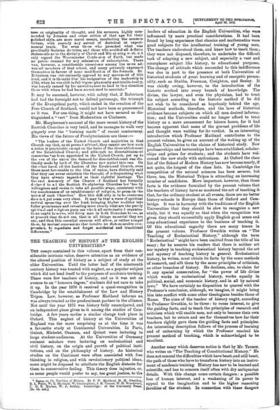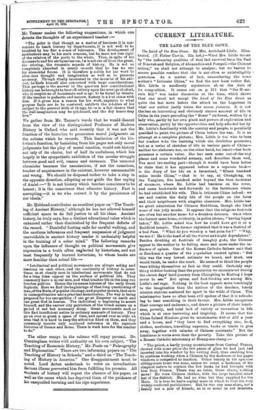THE TEACHING OF HISTORY AT THE ENGLISH UNIVERSITIES.*
Trre essays contained in this volume, apart from their con- siderable intrinsic value, deserve attention as an evidence of the altered position of history as a subject of study at the older Universities. Until the latter half of the nineteenth century history was treated with neglect, as a popular subject which did not lend itself to the purposes of academic training. There were few teachers of history, and as it was not an avenue to an "honours degree," students did not care to take it up. In the year 1870 it received a quasi-recognition in Cambridge by the establishment of the Law and History Tripos. Law, however, as Professor Maitland informs us, was always treated as the predominant partner in the alliance. Not until the year 1875 was history fully emancipated, and an independent place given to it among the studies of Cam- bridge. A few years earlier a similar change took place in Oxford. This neglect of history at the Universities of England was the more surprising as at the time it was a favourite study at Continental Universities. In Paris, Guizot, Michelet, Ozanam, and Quinet were lecturing to large student-audiences. At the Universities of Germany eminent scholars were lecturing on ecclesiastical and civil history, on the origin and growth of political insti- tutions, and on the philosophy of history. As historical studies on the Continent were often associated with free thinking in religion, and with revolutionary political ideas, some might be disposed to attribute the English distaste for them to conservative feeling. This theory does injustice, or, as some people would prefer to say, too great justice, to the
• Essays on the Teaching of History. By P. W. Maitland, H. M. Gwatkin, B. L. Poole, W. E. He.tlaud, W. Cunningham, J. B. Tanner, W. H. Woodward,
C. H. H. klarten, W. J. Aqhlga. Csauhridge at the University Press. f2s. 6& neta
leaders of education in the English Universities, who were influenced by more practical considerations. It had been found by long experience that classics and mathematics were good subjects for the intellectual training of young men. The teachers understood them, and knew how to teach them;
they were not disposed, therefore, to undertake the difficult task of adapting a new subject, and especially a vast and amorphous subject like history, to educational purposes. The change of attitude which succeeded to this indifference was due in part to the presence at both Universities of historical students of great learning and of energetic person- ality, such as Stubbs, Freeman, Creighton, and Seeley. It was chiefly owing, however, to the introduction of the historic method into every branch of knowledge. The divine, the lawyer, and even the physician, had to treat his subject according to the historic method if he did not wish to be considered as hopelessly behind the age. Historical methods, therefore, and the laws of historical evidence became subjects on which all men desired informa- tion; and the Universities could no longer afford to treat history as a mere amusement for leisure hours, for it had become apparent that some of the gravest problems of life and thought were waiting for its verdict. In an interesting introduction which Professor Maitland contributes to the present volume, he gives an account of the waking up of the English Universities to the claims of historical study. New professorships and lectureships have been established, scholar- ships and prizes for students ; and the students have wel- comed the new study with enthusiasm. At Oxford the class list of the School of Modern History has now become nearly, if not quite, the longest of the class lists. In Cambridge the competition of the natural sciences has been severer, but there, too, the Historical Tripos is attracting an increasing number of candidates. More important. however, than these facts is the evidence furnished by the present volume that the teachers of history have so mastered the art of teaching it that, for the ordinary student at all events, there are no better history-schools in Europe than those of Oxford and Cam- bridge. it was in harmony with the traditions of the English Universities that they should be slow to recognise a new study, but it was equally so that when the recognition was given they should successfully apply English gcod sense and long educational experience to the business of teaching it. Of this educational sagacity there are many traces in the present volume. Professor Gwatkin writes on "The Teaching of Ecclesiastical History," although the term " Ecclesiastical " might have been omitted from the title of his essay ; for he assures his readers that there is neither art nor mystery in teaching ecclesiastical history beyond the art and mystery of teaching history in general Ecclesiastical history, he writes, must obtain its facts by the same methods of research, and sift them by the same principles of criticism, as other branches of history. He declines, also, to claim for it any special consecration, for " the power of life divine which works in ecclesiastical history, works equally in political, social, and economic history, and in all by natural
laws." We have certainly no disposition to quarrel with the Professor's conclusion, although, we imagine, it might bring him into conflict with some other theologians besides those of Rome. The aims of the teacher of history ought, according to Professor Gwatkin, to be three : to rouse interest, to give the guiding facts, and to teach the principles of research and criticism which will enable men, not only to become their own teachers, but to return and see for themselves how far their
teachers rightly gave them the guiding facts and principles. An interesting description follows of the process of learning and of unlearning by which the Professor reached his present method of teaching, which is acknowledged to be excellent Another essay which deserves notice is that by Mr. Tanner, who writes on "The Teaching of Constitutional History." He does not conceal the difficulties which have beset, and still beset, the path of those who have to transform history into an instru- ment of academic training. History has now to be learned and scientific, and has to concern itself often with dry antiquarian details. With this change come certain dangers : a possible loss of human interest, and a weakening of its power to appeal to the imagination and to the higher reasoning faculties of the student. In connection with these dangers Mr. Tanner makes the following suggestions, in which one detects the thoughts of an experienced teacher "The point is that though as a matter of business it is con- venient to teach history by departments, it is not well to be troubled by too fine a sense of relevance. The development of institutions may be his main concern, but he must not lose sight of the relation of the parts to the whole. Thus, in spite of his documents and his antiquarianism, he is not cut off from the great, the stirring, the dramatic aspects of history. He is nut so completely absorbed in musty records that he has no eye for elemental forces. It is therefore p is:dill° for his work to stimelate thought and imagination as well as to promote accuracy. Though vitally interested in the minutiie of his sub- ject, he finds himself also concerned with large considerations. This perhaps is the answer to the question how constitutional history can be brought to bear effectively upon the avenge student, who is suspicious of documeuts and is apr. to be bored by details. If the teacher is pedantic and narrow, history is a lest cause with him. If it gives him a reason for his work, explains to what purpose facts are to be mastered, exhibits the relation of his subject to the general drift of things, th. le is a fair chance that the dull imagination may be quickened, and the dry bones may live."
We gather from Mr. Tanner's words that he would dissent from the view of the distinguished Professor of Modern History in Oxford who said recently that it was not the function of the historian to pronounce moral judgments on the actions which he records. This limitation of the his- torian's function, by banishing from his pages not only moral judgments but the play of moral emotion, would rob history not )nly of its charm, but of half its usefulness, which lies largely in the sympathetic exhibition of the secular struggle between good and evil, reason and unreason. The unmoral chronicler becomes the unconscious, if not the conscious, teacher of acquiescence in the existent, however unreasonable and wrong. We should be disposed rather to take a step in the opposite direction, adopting as our guide the fine saying of Amiel :—" It is not history which teaches conscience to be honest ; it is the conscience that educates history. Fact is corrupting.—it is we who correct it by the persistence of our ideals."
Mr. Heitland contributes an excellent paper on "The Teach- ing of Ancient History," although he has not allowed himself
sufficient space to do full justice to all his ideas. Ancient history, he truly says, has a distinct educational value which is enhanced rather than diminished by the frequent defects of the record. "Doubtful footing calls for careful walking, and the cautious inferences and frequent suspension of judgment unavoidable in ancient history render it undeniably helpful in the training of a sober mind." The following remarks upon the influence of thought on political movements give
expression to a truth often neglected by historians, and not least frequently by learned historians, to whom books are more familiar than actual life :—
" Intellectual and political movements are always acting and reacting on each other, and the continuity of history is some- times most clearly seen in intellectual movements that do not for a long time appear on the surface of political life. They commonly have a moral side, and what touches life in the long run touches politics. Hence the immense interest of the early Greek Sophists. Here we find the beginnings of that long questioning of so an, of the State, of popular theology, and popular morals, that ends in cosmopolitanism and a practical monotheism. The way is being prepared for the recognition f one gr. at Emperor on earth and one great God in heaven. The individual is beginning to assert himself, and the narrow city patriotism of the Greek enters on a peliod of sad but necessary decay. Great movements such as this find insufficient notice in ordinary manuals of history. They go on over so great a space of time, and spread over so wide an area that it is hard to keep the attention fixed on them, and they commonly receive only scattered reference in the separate histories of Greece and Some. There is work here for the teacher to do."
The other essays in the volume will repay perusal. Dr. Cunningham writes with authority on his own subject, "The
Teaching of Economic History," Mr. Poole on " Palzeography and Diplomatics." There are two informing papers on "The Teaching of History in Schools," and a third on "The Teach-
ing of History in America." One disappointment must be noted. Lord Acton undertook to write an introduction. Serious illness prevented him from folfiiiing his promise. All students of history will regret the absence of his paper, as
well as the cause which has deprived them of the guidance of his unequalled learning and his ripe experience.



























































 Previous page
Previous page